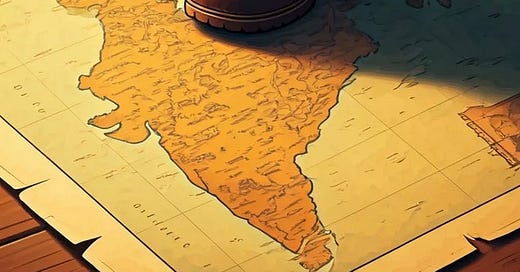More than two and a half centuries before Gandhi was born, an event took place that would shape his life and the lives of more than two billion Indians. It would transform the global economy and tilt the planetary power structure during the world wars of the last century. On August 24, 1600, the first English traders landed in Surat, a small port town in the province of Gujarat. The resulting encounter with the Moghul Emperor secured permission to build trading depots—the first of many English (British after 1707) structures across the subcontinent.

The East India Company had recently received a royal charter from Queen Elizabeth I, giving them an initial 15-year monopoly on all commerce beyond the Cape of Good Hope. The Dutch had dominated trade for many years, supplying exotic spices to European consumers. However, as many of us have seen on our own grocery shelves, a lack of competition allowed them to raise prices at will. When they jacked up the price of pepper by five shillings per pound in 1599, two dozen London merchants formed the East India Company.1
Trade with India was very lucrative; early investors saw profits as high as 200%. Besides raw goods like spices and sugar, the native population produced highly sought textiles formed from silk, cotton, and jute. By the dawn of the 18th century, India was a global hub for trade, with nearly 25% of the world’s total commercial activity taking place on the subcontinent!2 These were the days that Gandhi would later romanticize with the spinning wheel as a symbol of Indian power, before the Industrial Revolution enabled Great Britain to displace Indian artisans.
The European powers competing for India’s goods had an advantage over traders from China or the Middle East: silver.3 It backed the Indian rupee, and millions and millions of pounds of the shiny metal had been siphoned from South American mines. While most of it went to Spain first, the British were preferred to the Spanish because they didn’t push Christianity in India.4 The East India Company only cared for the profits of this world, not the next one.
The Company’s monopoly was withdrawn in 1813; other companies and missionaries were able to compete in southeast Asia. By then, they were no longer just engaged in trade. The East India Company’s military victory in the 1757 Battle of Plassey won them political power and the legal authority to tax the natives… but that’s another story.
What difference do you see between a corporation having the legal power to tax people versus having the unchecked economic power to increase consumer prices on essential commodities?
Freedom at Midnight (Larry Collins & Dominique Lapierre, 1975) p. 10
A History of British India (The Teaching Company, 2017) Lecture 3
Ibid.
Freedom at Midnight p. 11


